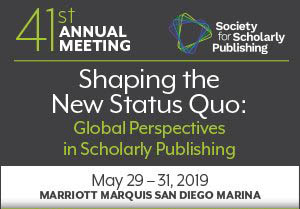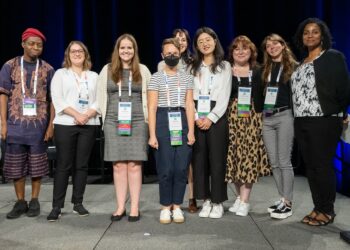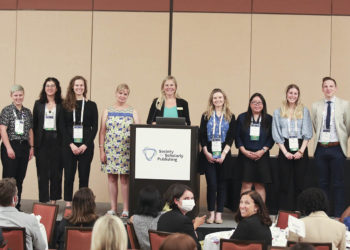Editor’s Note: Today’s post is an interview of Tim Lloyd conducted by Rebecca Benner. Tim is founder and CEO of LibLynx, a company providing Identity, Access, and Analytics solutions for publishers and libraries and Co-Chair of the Society for Scholarly Publishing’s (SSP’s) Annual Meeting Program Committee. Rebecca is Managing Editor for the American Society of Anesthesiologists and Co-Chair of the SSP’s Early Career Subcommittee.
The deadline for submitting a proposal for a session at the SSP’s Annual Meeting is rapidly approaching (November 14). What do you want to see at the Meeting? Submit your proposal and let the SSP know!
What is the theme of the 2024 SSP Annual Meeting? How did the annual Meeting Program Committee come up with the theme, and why is it significant/important?
The theme of this year’s conference is “Inflection Point: Setting the Course for the Future of Scholarly Communication”, reflecting our belief that the consequential decisions we make over the next year will determine both the value we deliver as an industry, as well as the values we reflect as a community.
An effective conference theme is a call to action to the community that it represents — the reason why we all take time out to submit proposals and/or attend. It needs to speak to a broad range of people, while still having something important and timely to say about this moment. This year’s conference theme arose out of a series of conversations among the 40+ members of the Annual Meeting Program Committee, and were then refined by our 10 member subcommittee.
We all felt that the pace and significance of change was greater now than we had seen in recent years. Significant trends from over the last few years continue to reshape our work: the huge growth in proposals and publications; a greater focus on researchers as both author and reader; evolving open access publishing models; and the urgent need for equity and inclusion. The emerging, explosive capabilities of artificial intelligence seem likely to disrupt every facet of scholarly communication, but represent both opportunities and threats.
Our theme addresses the bigger questions this poses to our community — how will all this disruption impact the value of scholarly publishing, and what values do we want to embed as our traditional workflows and infrastructure change to meet these evolving needs.
Could you talk a bit about the Annual Meeting Program Committee itself? Who are they, what experience and viewpoints do they bring to the planning process, and — briefly — how does that process work (from planning to execution)?
The Program Committee is critical to delivering our Annual Meeting. In fact, one of the first decisions we make each year is around representation: ensuring that our committee reflects the community that will be attending the conference. A third of this year’s committee members are new, and we have deliberately broadened the membership to reflect more diverse perspectives, such as researchers and early career professionals. Every one of our committee members brings valuable experience when it comes to crafting a program that will increase participation and representation across our community.
The work of the committee members falls into two parts. Initially, the focus is on planning the meeting: the theme, the call for proposals, the plenaries (keynotes, Previews, debates), and reviewing the many submissions to curate a timely and appealing program. Early in the new year our focus switches to delivery: working with session organizers to help them plan and execute their ideas, and supporting the other program ingredients, such as posters and the Previews sessions.
Let’s say an SSP member needs to make a case for their attendance at SSP’s Annual Meeting in 2024 — what’s your elevator pitch for the Annual Meeting?
The Annual Meeting is the single most effective professional development opportunity in our industry. Whether your need is to stay on top of all the fast-developing trends in our industry, understand issues in more depth, or influence emerging issues with your organization’s perspectives. Add on top the unparalleled networking opportunities from spending several days with almost a thousand of your peers, and you’ve got a powerful cocktail for enhancing your ability to deliver your role and add value to your employer.
Thinking about why people may want to attend in 2024 — what do you see as the benefits for early career professionals? How about those who are mid-career or later in their careers?
The most powerful benefit for early career professionals is understanding the landscape and finding people to help them navigate it. Our industry is complex and our community diverse. It’s incredibly hard to wrap your head around working from a desk. The Annual Meeting gives early career professionals an opportunity to hear the experts from across our community share their thoughts on the issues of the day — invaluable input to help you think about your career and where you want to take it. In tandem, you also get opportunities (both structured and unstructured) to meet people who can help you with that journey, whether it’s informal advice or formal mentoring.
The annual meeting offers those who are mid-career or later an opportunity to learn more about the areas they focus on and contribute to those discussions, whether as a formal speaker or through questions and conversation during the meeting. Those contributions have the potential to move your career forward in profound ways, such as participation in industry working groups or by elevating your profile for potential future roles. There’s no one model for professional development, and the beauty of the Annual Meeting is that it provides a smorgasbord of opportunities to choose from — a “create your own adventure”.
What are the top three things you hope attendees take away from the Annual Meeting in 2024?
We hope that, at a minimum, every attendee takes away (i) new knowledge that helps them to be more effective in their roles, (ii) new colleagues in the industry to help them further develop their knowledge and careers, and (iii) a renewed sense of belonging in — and shared ownership of — our scholarly publishing community.
What will success look like for the Annual Meeting Committee in 2024?
From the committee’s perspective, successes come in a series of planning milestones in the nine months leading up to next May’s annual meeting. We nailed the theme; we found great speakers for our plenaries; we attracted enough session proposals to curate a great program; etc. But, ultimately, it’s the feedback from our community that scores our work. If the post-meeting feedback after next year’s Annual Meeting indicates that attendees found it a valuable use of their time, then we were successful. If they loved it and made lots of new friends — as many of us do — even better!
Once again, the submission deadline for session proposals for the 2024 SSP Annual Meeting is November 14.




